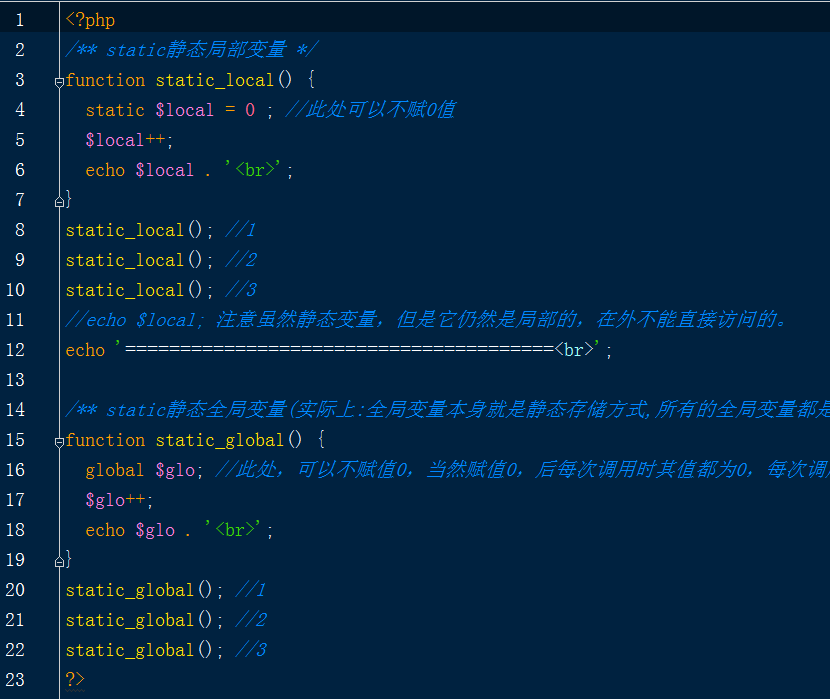
Local variables can be divided into dynamic storage types and static storage types in terms of storage methods. Local variables in a function, unless specifically declared as static storage class, will allocate storage space dynamically by default. The internal dynamic variables are automatically released after the function call. If you want the internal variables to remain in memory after the function is executed, you should use static variables. After the function is executed, the static variables will not disappear, but will be shared among all calls to the function. That is, when the function is executed again, the static variables will continue to operate from the previous results, and will only be used during the execution of the script. The period function is initialized the first time it is called. To declare a function variable as static, you need to use the keyword static. Earlier we introduced the local variables in the scope of PHP variables and the global variables in the scope of PHP variables. Static variables can be applied anywhere. Once the application is successful, it will no longer accept other similar applications. A static variable does not mean that it cannot change its value. A quantity that cannot change its value is called a constant. The value it holds is mutable, and it will remain up-to-date. It is said to be static because it does not change when the function is called or exits. That is, the last call

Introduction: Local variables can be divided into dynamic storage types and static storage types in terms of storage methods. Local variables in a function, unless specifically declared as static storage class, will allocate storage space dynamically by default.
2. PHP source code learning thread safety
Introduction: In terms of scope, C language can be defined 4 different kinds of variables: global variables, static global variables, local variables, static local variables.
3. static local variables of php
Introduction::This article mainly introduces the static local variables of php Variables, students who are interested in PHP tutorials can refer to it.
4. Summary of PHP static local static variables and global static variables_PHP tutorial
Introduction: PHP static local Summary of static variables and global static variables. Characteristics of static local variables: 1. It will not change as the function is called and exits. However, although the variable continues to exist, it cannot be used. If the function that defines it is called again
##5. Look at the characteristics of C, C++, C#, Java, and PHP through static local variables
Introduction: Look at the characteristics of C, C++, C#, Java, and PHP through static local variables
6. Summary of PHP static local static variables and global static variables
Introduction: Summary of PHP static local static variables and global static variables. Characteristics of static local variables: 1. It will not change as the function is called and exits. However, although the variable continues to exist, it cannot be used. If the function that defines it is called again
7. Summary of PHP static local variables and static global variables
Introduction : 1. It will not change as the function is called and exits. However, although the variable continues to exist, it cannot be used. If the function that defines it is called again, it can continue to be used, and the value left after the previous call is saved. 2. Static local variables will only be initialized once. 3. Static properties can only be initialized to a character value or a Constants cannot be used
8. PHP static Summary of local static variables and global static variables_PHP
Introduction: The reason for using a static local variable is that it cannot be used externally, but its value is retained after no such use. Although the same functionality can be achieved using global variables, it often results in unexpected
The above is the detailed content of 8 recommended articles about PHP static local variables. For more information, please follow other related articles on the PHP Chinese website!




